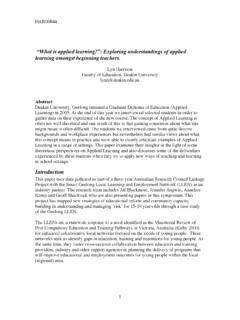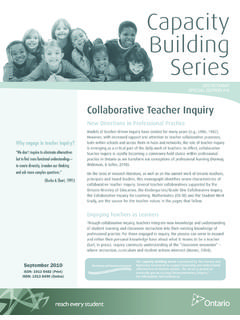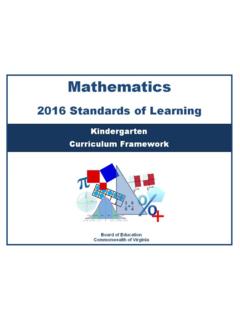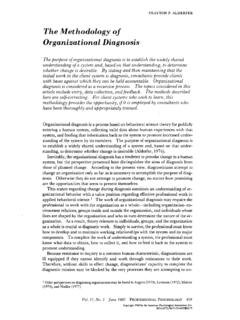Transcription of “What is applied learning?”: Exploring understandings of ...
1 HAR06844. What is applied learning ? : Exploring understandings of applied learning amongst beginning teachers. Lyn Harrison Faculty of Education, Deakin University Abstract Deakin University, Geelong initiated a Graduate Diploma of Education ( applied learning ) in 2005. At the end of this year we interviewed selected students in order to gather data on their experience of the new course. The concept of applied learning is often not well theorised and one result of this is that gaining consensus about what this might mean is often difficult. The students we interviewed came from quite diverse backgrounds and workplace experiences but nevertheless had similar views about what this concept means in practice and were able to clearly articulate examples of applied learning in a range of settings.
2 This paper examines their insights in the light of some theoretical perspectives on applied learning and also discusses some of the difficulties experienced by these students when they try to apply new ways of teaching and learning in school settings. Introduction This paper uses data gathered as part of a three year Australian Research Council Linkage Project with the Smart Geelong Local learning and Employment Network (LLEN) as an industry partner. The research team includes Jill Blackmore, Jennifer Angwin, Annelies Kamp and Geoff Shacklock who are also presenting papers in this symposium. This project has mapped new strategies of educational reform and community capacity building in understanding and managing risk' for 15-19 year-olds through a case study of the Geelong LLEN.
3 The LLENs are a statewide response to a need identified in the Ministerial Review of Post Compulsory Education and Training Pathways in Victoria, Australia (Kirby 2000). for enhanced collaborative local networks focused on the needs of young people. These networks seek to identify gaps in education, training and transitions for young people. At the same time, they foster cross-sectoral collaboration between education and training providers, industry and other support agencies in planning the delivery of programs that will improve educational and employment outcomes for young people within the local (regional) area. 1. HAR06844. As we have pointed out elsewhere: LLENs play a strategic role in mapping gaps in provision of services and participation opportunities for 15-24 year-olds in educational settings and in the management of effective transitions to employment and further education and training.
4 The focus is clearly on establishing and supporting networks for community capacity building in meeting diverse transitional needs of young people (Harrison & Shacklock, 2007). Another paper in this symposium (see Kamp, 2006) outlines the genesis and rationale for the introduction of the Graduate Diploma of Education ( applied learning ) at Deakin University and the community consultation role the LLEN. played in supporting and fostering its initiation. This new qualification was one response to the challenges presented by the introduction of the Victorian Certificate of applied learning (VCAL)1 seen as an alternative post-compulsory pathway for students largely unsuited to the narrow academic' orientation of the Victorian Certificate of Education (taken in years 11 &12).
5 It was envisaged that entrants into the GDAL, drawn from a range of trade and other experiences, would be able to draw on their professional knowledge and skills in teaching VCAL once they were able to gain teacher registration. The idea was that these students' industry experience would give them the credibility to challenge the entrenched practices of other teachers' (Kamp in this symposium). The course structure includes blocks of on-campus teaching, combined with substantial periods of teaching experience in a range of settings, including schools and non- government education providers. Methods Towards the end of the first year of the GDAL students were invited to talk to us about their work and personal histories, their experiences of the course and their industry placements.
6 We also asked them to talk about what applied learning meant to them. Interviews were taped and transcribed. We interviewed three women and three men at length. Our intention was to interview more but the end of the university year and our own marking workloads got in the way. These interviews formed part of our ongoing research for the Linkage project with the LLEN as industry partner, as well as providing us with evaluative information on the course itself. What is applied learning ? The concept of applied learning is often equated to hands on' or practical learning experiences. However, since the 1990's (sic) when increased attention was given to the links between education, training and the world of work' a broader definition of applied learning has emerged.
7 This broader definition advocates an approach which contextualised learning in a way which empowers and motivates students, while assisting them to develop 2. HAR06844. key skills and knowledge required for employment, further education and active participation in their communities (VQA, 2004, p. 1). The focus in the Victorian Qualifications Authority (VQA) VCAL Information Sheet (2004) is on student centred' learning , integrating theory and practice and moving students towards more adult and independent learning . They list eight key applied learning principles that are worth noting here, as they will be returned to later: 1. Start where learners are at 2. Negotiate the curriculum. Engage in a dialogue with learners about their curriculum.
8 3. Share knowledge. Recognise the knowledge learners bring to the learning environment. 4. Connect with communities and real life experiences. 5. Build resilience, confidence and self worth consider the whole person. 6. Integrate learning the whole task and the whole person. In life we use a range of skills and knowledge. learning should reflect the integration that occurs in real life tasks. 7. Promote diversity of learning styles and methods. Everyone learns differently. Accept that different learning styles require different learning /teaching methods. But value experiential, practical and hands on' ways of learning 8. Assess appropriately. Use the assessment method that best fits' the learning content and context (2004, p.)
9 1). Current understanding of the term applied learning ' varies from state to state in Australia and more broadly from country to country. This concept, although not always referred to as applied learning probably has its genesis in the focus on child centred' learning that can be traced back to the 19th Century. As one example, Chung & Walsh have written about the history of meanings associated with this concept in Early Childhood Education. They maintain that in the American context Freidrich Froebel first used the term child centred in relation to the new kindergarten movement (2000, p. 216). They point out that even at its genesis there was a struggle over its meaning which was dependent on which ideological sub-group you belonged to.
10 As a result, and using Kliebard (1995), they maintain that the term contains many currents'. This contestation over meanings is till present in curriculum innovations today, with successive iterations containing continuities and threads from the past (see for example Collins, 2000). In the context of my work as a pre-service teacher educator John Dewey and later, Jerome Bruner and their particular focus on child centred learning are more familiar. Dewey is widely understood to be the founder of the progressive education movement with its focus on experiential and child-centred learning and related topics evident, for example, in My Pedagogical Creed (1897); a text still used in our undergraduate Education Studies Major units today.




